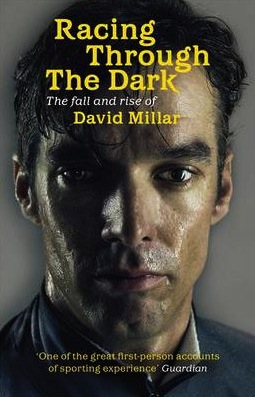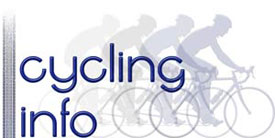During the USADA publication on US postal, I was hoping to hear some intelligent and progressive views from current professional cyclists on the issue of doping. Unfortunately, such views were pretty hard to come by, and some comments left you despairing for the future of cycling. However, one of the few who spoke quite intelligently was ex-doper David Millar.(BTW: nice article here by fellow Scot and former T de F King of the Mountains – Robert Millar)
Because of this I was interested in reading his own account - David Millar – Racing through the dark.

Firstly, it’s an excellent read. It’s a real roller coaster of emotion, twists and turns. Like many things in professional cycling – you couldn’t make it up. Truth really is stranger than fiction.
From a purely personal point of view – I was struck by one photo early in the book. It was a young David Millar beating Danny Axford in a High Wycombe road race on Aston Hill.
Aston hill (near Stokenchurch) just happens to be my favourite training hill – I’ve done it countless times. Secondly Danny Axford is a local rider I’ve later raced against – we’re often quite close. I think Danny even sometimes reads this blog. A quick check of David Millar’s birthdate shows he’s just couple of months younger than me. Who knows, if I’d had David Millar’s obvious natural talent, the story could have been about me.
A few thoughts about the book.
A key feature of the book is obviously about David Millar’s decision to dope. Tyler Hamilton claimed in his book there was a 1000 day time delay before a neo-pro finally succumbed to the drug taking culture. David may well have held out a few days more than others. But, the book shows how the pressures and structures make doping a strong likelihood and something that could be avoided in the majority of cases - if only the culture was different. It also makes you really admire those riders who stayed clean during that era – like David Moncoutie.
Judgement. It’s hard not to read about doping without creating very strong judgements. This book will soften your sense of judgement – doping is not quite as black and white as we make it out to be, but at the same time it makes you more passionate about creating the right atmosphere in cycling so the pressure is not to dope – rather than the old school way of being pressured TO dope.
Unfortunately, not all dopers take the same path to redemption as David Millar. There is usually a much longer period of denial, and their later actions and words don’t give you any confidence they have really changed their belief system. David must be applauded for at least turning things around. It is particularly relevant at the current time. Admitting to doping, and making a clean start can work. There’s a lot more dignity in coming clean than sticking to an absurd and continual denial.
The book has a very strong, and relevant point. No matter how bad things have been in the past – individuals, teams and the sport as a whole - always have the opportunity to choose a different path. David Millar’s life hit rock bottom. But, he was able to turn it around. He simply started making different choices and associating with different people. Cycling needs examples like that at the moment. It shows cycling doesn’t have to stay stuck in the dung heap of controversy.
Some would see the doping culture and give up. But, it’s also possible to promote a different approach. There’s always that choice.
I once heard David Brailsford state that a really professional team who didn’t dope could still beat dopers because teams who dope often forget to do other important things. I often wondered what he meant by that, but if you look at the completely chaotic nature of Cofidis team – you begin to understand why. It’s hard to imagine a bigger contrast between Cofidis and Team Sky.
David Brailsford has had a tough year, with the prominence of doping questions in the support. But, again you have to admire how he stood by David Millar during his darkest hour.
David Millar is no saint. Far from it. I feel that often doping bans are far too lenient. David Millar is an excellent example of how people can benefit from second chances. But, looking at the bigger picture, longer bans – especially for those in positions of responsibility (doctors, director sportives) are important.
David Millar’s natural talent is immense. I was shocked at the number of times, David wasn’t training, but having a lot of drinks! If he had been really nurtured and looked after from an early stage, I’m sure he could have achieved much more. He obviously has huge natural talent.
Overall
A good insiders look at how riders can get dragged into doping. A tragic portrayal of how doping can really ruin your life. But, ultimately, it really is about redemption – and cycling could do with a few role models at the moment – how ironic that we have a former ex-doper becoming one of the few professional cyclists to say what cycling fans really want to hear. Maybe he should send a copy to his old friend Lance Armstrong.
As to the question of UCI President? – well why not? He’d be better than some of those in charge at the moment.
Buy online
- David Millar – Racing through the dark. at Amazon.co.uk
- David Millar – Racing through the dark. at Amazon.com
Related

interesting article by Brad McGee mentioned in David Millar’s book when he beat him by 1 sec. Millar later confessed he deserved to win, because he was doped at the time
http://www.smh.com.au/sport/cycling/how-dopers-stole-the-best-years-of-my-career-20121026-28aif.html
some good interviews from the Sky boys
http://www.bbc.co.uk/sport/0/cycling/20073400
Yes, Cavendish is a good ambassador for the sport.
Perhaps Mark Cavendish’s views, published at the same time as this article, give you the ‘intelligent and progressive views from current professional cyclists on the issue of doping.’ you are looking for.
http://www.bbc.co.uk/sport/0/cycling/20051664
I do find his personality and ways of expressing himself difficult but the nub of what he actualy says is very, very good. I hope he does really well in the coming TdeF, though the course sounds horrendous this year!